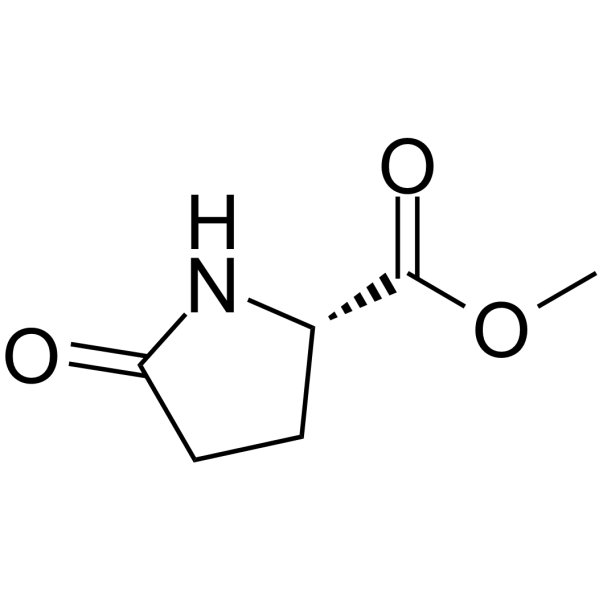
Methyl L-pyroglutamate
CAS No. 4931-66-2
Methyl L-pyroglutamate( (S)-Methyl 5-oxopyrrolidine-2-carboxylate | L-Pyroglutamic acid methyl ester )
Catalog No. M26296 CAS No. 4931-66-2
Methyl L-pyroglutamate shows anti-inflammatory activity. Methyl L-pyroglutamate is isolated from Portulaca?oleracea?L.
Purity : >98% (HPLC)
 COA
COA
 Datasheet
Datasheet
 HNMR
HNMR
 HPLC
HPLC
 MSDS
MSDS
 Handing Instructions
Handing Instructions
| Size | Price / USD | Stock | Quantity |
| 500MG | 38 | Get Quote |


|
| 1G | Get Quote | Get Quote |


|
Biological Information
-
Product NameMethyl L-pyroglutamate
-
NoteResearch use only, not for human use.
-
Brief DescriptionMethyl L-pyroglutamate shows anti-inflammatory activity. Methyl L-pyroglutamate is isolated from Portulaca?oleracea?L.
-
DescriptionMethyl L-pyroglutamate shows anti-inflammatory activity. Methyl L-pyroglutamate is isolated from Portulaca?oleracea?L.
-
In Vitro——
-
In Vivo——
-
Synonyms(S)-Methyl 5-oxopyrrolidine-2-carboxylate | L-Pyroglutamic acid methyl ester
-
PathwayOthers
-
TargetOther Targets
-
Recptor——
-
Research Area——
-
Indication——
Chemical Information
-
CAS Number4931-66-2
-
Formula Weight143.142
-
Molecular FormulaC6H9NO3
-
Purity>98% (HPLC)
-
SolubilityIn Vitro:?DMSO : 100 mg/mL (698.62 mM)
-
SMILESCOC(=O)[C@@H]1CCC(=O)N1
-
Chemical Name——
Shipping & Storage Information
-
Storage(-20℃)
-
ShippingWith Ice Pack
-
Stability≥ 2 years
Reference
1.Clements JS 2nd, Islam R, Sun B, Tong F, Gross AD, Bloomquist JR, Carlier PR. N'-mono- and N, N'-diacyl derivatives of benzyl and arylhydrazines as contact insecticides against adult Anopheles gambiae. Pestic Biochem Physiol. 2017 Nov;143:33-38.
molnova catalog



related products
-
Stresscopin-Related ...
Stresscopin-related peptide (human) is a specific ligand for the type 2 CRH receptor. Stresscopin-related peptide (human) suppresses food intake, delayed gastric emptying and decreases heat-induced edema. Stresscopin-related peptide (human) maintains homeostasis after stress, and can be used in the research of stress-related diseases.
-
Aniline-2-sulfonic a...
2-Aminobenzenesulphonic acid is a useful research chemical.
-
Subtilisin
Subtilisin, also known as rubinase, is a serine protease of bacterial origin. This enzyme exhibits thermal stability, pH tolerance, and calcium-dependent stability, characteristics that make it suitable for use as an additive in detergents .



 Cart
Cart
 sales@molnova.com
sales@molnova.com


